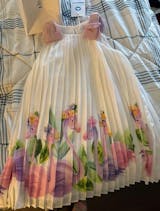When it comes to choosing clothes for children, parents want the best—soft, safe, and sustainable fabrics that keep their little ones comfortable while also being kind to the environment.
Babies and young children have delicate skin that is more sensitive to harsh chemicals and synthetic materials. That’s why selecting the right fabric for their clothing is crucial. Organic cotton has emerged as the preferred choice for parents who value health, sustainability, and ethical production.
Unlike conventional cotton, organic cotton is grown without harmful chemicals, pesticides, or synthetic fertilizers, making it a much safer option for children’s sensitive skin. Additionally, the process of growing and harvesting organic cotton is more sustainable, reducing environmental impact and promoting fair labor practices.
By choosing organic cotton clothing, parents can provide their children with the comfort and protection they need while also making an environmentally responsible choice. Let’s explore in more detail why organic cotton is the ideal fabric for kids’ wardrobes.
1. Gentle on Sensitive Skin
Children, especially babies and toddlers, have delicate skin that can be easily irritated by synthetic fabrics and harsh chemicals. Organic cotton is free from pesticides, fertilizers, and toxic dyes, reducing the risk of allergic reactions, rashes, and other skin issues. It provides a soft and breathable texture, ensuring comfort all day long.
Additionally, the natural fibers allow air to circulate, preventing excessive sweating and overheating, which is particularly beneficial during warmer months.
2. Free from Harmful Chemicals
Conventional cotton farming uses a high amount of pesticides and synthetic fertilizers, many of which can linger on the fabric even after processing. These chemicals can cause skin irritations, respiratory problems, and other health concerns.
Organic cotton, on the other hand, is produced using natural methods, ensuring that no harmful residues remain in the fabric. Parents can feel more confident dressing their children in clothing that does not expose them to toxic substances.
3. Eco-Friendly and Sustainable
The environmental impact of conventional cotton farming is significant, contributing to soil degradation, water pollution, and excessive water consumption. Organic cotton is grown using sustainable farming practices, including crop rotation, composting, and biological pest control. It requires less water and helps maintain soil health, making it a more eco-conscious option.
Moreover, organic cotton farming eliminates the use of genetically modified seeds, preserving biodiversity and supporting ecological balance.
4. Better for Farmers and Workers
Organic cotton farming promotes ethical and fair-trade practices. Conventional cotton farming often exposes workers to toxic chemicals, leading to serious health issues. By choosing organic cotton, you support better working conditions, fair wages, and sustainable farming communities.
Many organic cotton certifications, such as GOTS (Global Organic Textile Standard), ensure that workers are treated fairly and that farming practices adhere to ethical standards.
5. Durability and Longevity
Organic cotton is not only soft but also highly durable. Since it is not treated with harsh chemicals, its natural fibers remain strong, making clothes last longer. This means fewer replacements and less waste, helping parents save money in the long run.
Additionally, because organic cotton retains its shape and softness even after multiple washes, it is a practical investment for parents who want high-quality clothing that stands the test of time.
6. Biodegradable and Less Wasteful
Unlike synthetic fabrics, which can take hundreds of years to decompose, organic cotton is biodegradable. When discarded, it breaks down naturally without leaving behind microplastics or toxic residues, reducing textile waste and contributing to a cleaner environment. This is especially important in a world where fast fashion contributes significantly to pollution.
By choosing organic cotton, parents can help reduce landfill waste and promote a circular economy.
7. Stylish and Versatile
Organic cotton clothes come in a variety of stylish designs, vibrant colors, and adorable patterns, making them just as fashionable as conventional clothing. Whether you’re looking for soft rompers, comfy t-shirts, or cute dresses, organic cotton offers an excellent selection of trendy and sustainable options.
Many brands, including those specializing in organic fashion, prioritize both aesthetics and sustainability, ensuring that parents don’t have to compromise on style.
8. Hypoallergenic and Ideal for Children with Skin Conditions
For children who suffer from eczema, allergies, or other skin conditions, organic cotton is an excellent choice. Because it is free from harsh dyes, chemical softeners, and synthetic additives, organic cotton reduces the likelihood of irritation and discomfort.
Pediatricians and dermatologists often recommend organic cotton for children with sensitive skin, as it allows the skin to breathe while providing a natural and soothing touch.
Comparison: Organic Cotton vs. Conventional Cotton
|
Feature |
Organic Cotton |
Conventional Cotton |
|
Chemical-Free |
Yes |
No |
|
Skin-Friendly |
Yes |
Can cause irritation |
|
Environmental Impact |
Low |
High |
|
Durability |
High |
Lower due to chemical exposure |
|
Ethical Production |
Fair wages, safe conditions |
Often linked to poor labor practices |
|
Water Usage |
Less |
High |
|
Biodegradable |
Yes |
Partially, with microplastics |
Making the Switch to Organic Cotton
Switching to organic cotton for your child’s wardrobe is a small yet impactful step toward a healthier and more sustainable future. From onesies and pajamas to jackets and accessories, there are plenty of organic cotton options available for children of all ages.
As awareness grows, more brands are incorporating organic cotton into their collections, making it easier than ever for parents to access high-quality, eco-friendly clothing.
Final Thoughts
Organic cotton is more than just a trend—it’s a responsible choice for parents who prioritize their child’sho prioritize their child’s health and the environment. With its numerous benefits, from being chemical-free and durable to eco-friendly and stylish, organic cotton stands out as the superior fabric for kids’ clothing. By making the switch to organic cotton, you are investing in high-quality clothing that protects your child’s delicate skin while also supporting ethical and sustainable production practices.
If you're ready to embrace a healthier, more sustainable wardrobe for your little ones, explore the organic cotton collection at Jenni Kidz. Their carefully curated selection offers soft, stylish, and eco-friendly outfits designed with your child’s comfort and well-being in mind. Choose organic, choose sustainable—shop at Jenni Kidz.




























